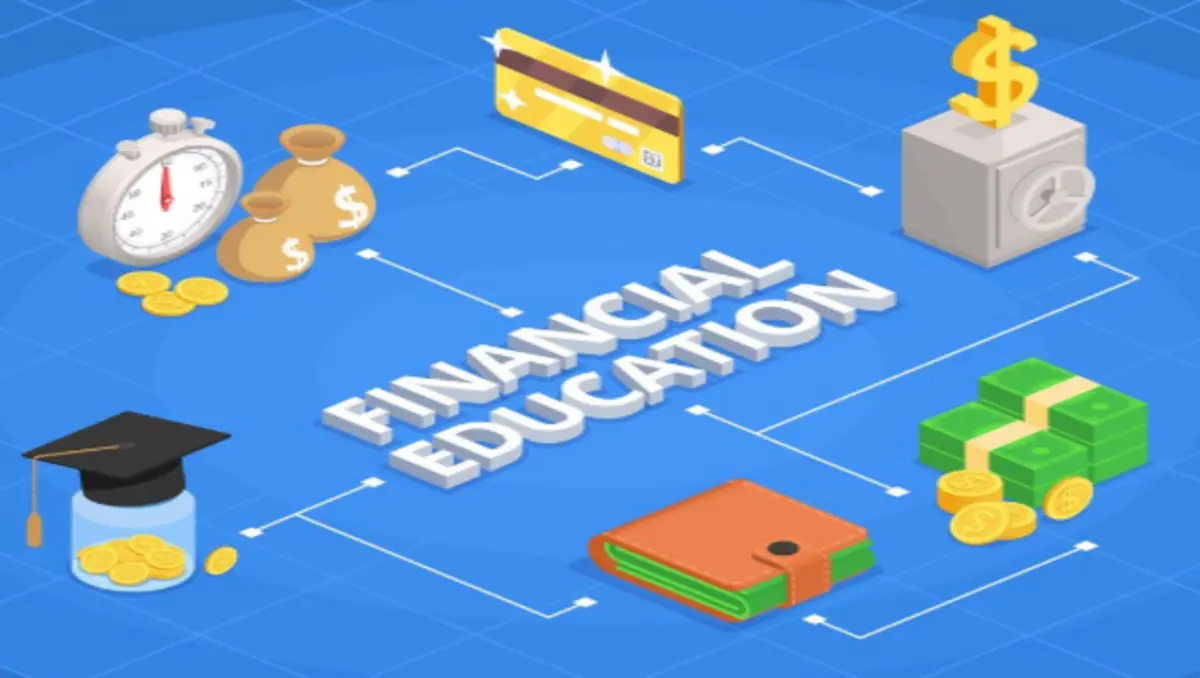In today’s world, where financial decisions are an essential part of daily life, it’s crucial for everyone—young or old—to have a good understanding of money management. This is where financial education comes in Money related instruction is the capacity to get it and apply information https://financekhush.com
What is Financial Education?
Financial education refers to the knowledge and skills required to make informed and effective decisions about personal financial management. This incorporates a wide run of subjects, such as:
- Budgeting: Making a arrange to oversee pay and costs successfully.
- Sparing:Setting aside cash for future needs or crises.
- Contributing:: Putting cash into budgetary items like stocks, bonds, and genuine bequest to construct riches over time.
- Credit Management: Understanding how credit works, using it responsibly, and maintaining a good credit score.
- Insurance: Protecting yourself and your loved ones from financial risks through different types of insurance.
- Retirement Planning: Planning for financial security in retirement through savings, pensions, and other investment options.
By learning about these essential topics, you can gain better control of your finances and make choices that support your long-term financial goals.
Why is Financial Education Important?
- Empowerment and Control
One of the most significant benefits of financial education is empowerment.After you understand how cash works, you’ll be able make choices that adjust along with your values, objectives, and way of life You won’t feel overwhelmed or confused when it comes to managing your finances. Whether it’s knowing how to track your spending or how to plan for future financial milestones, being financially educated helps you feel more in control of your life. - Avoiding Debt and Financial Stress
Without financial education, it can be easy to fall into the trap of accumulating debt. Many people end up taking out loans or using credit cards irresponsibly because they don’t fully understand how debt works. Learning around credit, intrigued rates, and the results of borrowing can assist you dodge expensive botches. A solid understanding of budgeting and saving also helps you stay out of debt by ensuring that you live within your means. - Building Wealth for the Future
Money related instruction instructs you the significance of sparing and contributing . By understanding how to set up savings accounts, invest in the stock market, or start a retirement plan, you can work towards building wealth over time. The prior you begin sparing and contributing, the superior, because it gives you the control of compound interest—the concept that your cash gains intrigued on both the foremost and the accumulated interest. - Achieving Financial Goals
Everyone has financial goals, whether it’s buying a house, paying for your children’s education, or traveling the world. Financial education helps you understand how to plan and take the necessary steps to reach these goals. By learning how to budget, save, and invest, you can make your financial dreams a reality. - Financial Independence
Being financially educated is a key factor in achieving financial independence. It means having the ability to support yourself without relying on others, whether through a job or savings. The more you know about money management, the more likely you are to make smart choices that allow you to live comfortably without worrying about money constantly.
The Basics of Financial Education

1. Budgeting: The Foundation of Good Money Management
A budget is basically a arrange for how you’ll spend your cash It helps you prioritize your needs, save for the future, and avoid unnecessary expenses. The primary step in budgeting is to track your wage and costs . Once you know how much money you have coming in and where it’s going, you can create a budget that ensures your spending aligns with your goals.
Here are a few basic steps to make a budget:
- Step 1: List all sources of income (e.g., salary, business profits, side gigs).
- Step 2: Track all your monthly expenses (e.g., rent, utilities, groceries, entertainment).
- Step 3: Categorize your expenses into needs and wants.
- Step 4: Set realistic spending limits for each category.
A good budget is flexible and helps you stay on track without feeling deprivedIt gives you control over your cash rather than letting it control you.
2. Saving: Preparing for the Unexpected
Sparing cash is fundamental for both short-term needs and long-term objectives. . It’s a way to prepare for emergencies, large expenses, or financial setbacks. Ideally, everyone should have an emergency fund—typically three to six months of living expenses—saved up for unexpected situations like job loss or health issues.
A good tip is to automate your savings by setting up automatic transfers from your checking account to a savings account each month. This makes saving easier and helps you stick to your financial goals.
3. Investing: Growing Your Money
While saving is crucial, investing is how you make your money work for you. Investing allows you to grow your wealth by putting your money into assets that have the potential to increase in value over time.The foremost common shapes of ventures incorporate stocks, bonds,
common stores, and genuine domain.
Contributing isn’t fair for the affluent; anybody can begin contributing with as little as some dollars. The key is to start early and take a long-term approach.Contributing in a retirement account like a 401(k) or an IRA is an fabulous way to arrange for your future whereas getting a charge out of charge preferences.
Before you begin investing, it’s essential to educate yourself about the different types of investments, the associated risks, and the potential returns. It’s also wise to diversify your portfolio, which means spreading your investments across different asset classes to reduce risk.

4. Managing Debt: Using Credit Responsibly
Debt is a tool that can help you achieve goals like buying a home or getting an education, but it can also be a burden if mismanaged. Credit cards, loans, and mortgages can be useful when used responsibly, but high-interest rates and missed payments can lead to financial stress.
To manage debt effectively:
- Pay off high-interest debt first (such as credit card balances).
- Avoid taking on more debt than you can afford to repay.
- Make timely payments to maintain a good credit score.
- Understand the terms of your loans and credit cards, including interest rates and repayment schedules
Responsible debt management is an essential part of financial education, helping you stay in control of your finances and avoid falling into a debt trap.
How to Improve Your Financial Education
Improving your financial education doesn’t require an advanced degree in finance. Here are some practical ways to boost your financial literacy:
- Read Financial Books and Articles
There are many excellent resources available online and in bookstores that explain personal finance concepts in simple terms. Reading books and articles is a great way to build your knowledge at your own pace. - Take Online Courses
There are plenty of free or low-cost online courses designed to teach financial education. Websites like Coursera, Udemy, and Khan Academy offer beginner to advanced courses on a wide range of financial topics. - Listen to Podcasts and Watch Videos
Podcasts and YouTube channels are great ways to learn on the go. There are many personal finance experts who offer advice on budgeting, investing, and managing money. - Consult with a Financial Advisor
If you’re unsure where to start or need personalized guidance, consulting with a certified financial planner or advisor can be helpful. They can help you create a financial plan tailored to your needs and goals. - Practice What You Learn
The best way to solidify your financial education is to apply what you’ve learned. Start small by creating a budget or setting up a savings account. Over time, as you gain more knowledge, you can take on more advanced financial strategies.

Conclusion
Financial education is essential for leading a successful and stress-free financial life. By understanding key concepts like budgeting, saving, investing, and managing debt, you can make smarter decisions, avoid pitfalls, and build wealth over time. Remember, financial literacy is a journey, not a destination. The more you learn, the more empowered you will feel to take control of your financial future.









